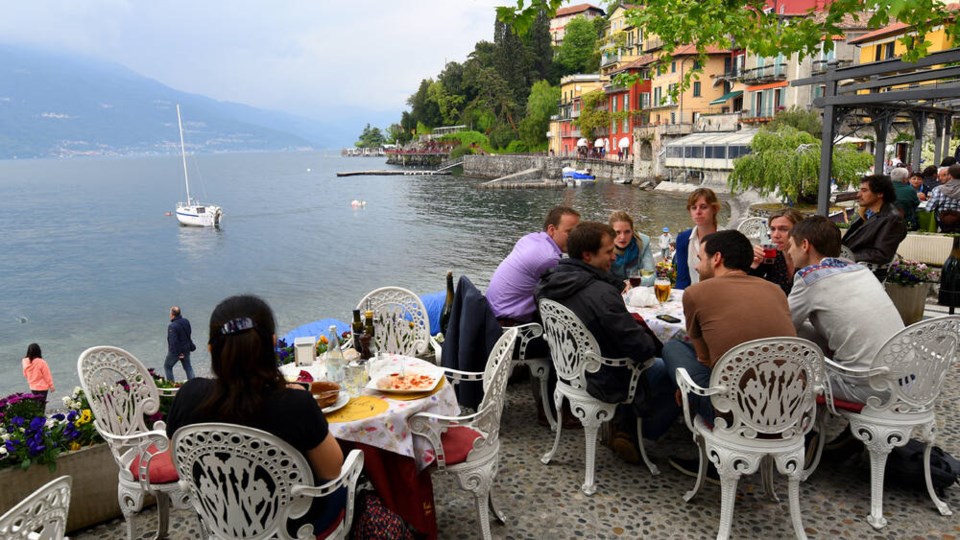Stretched over two chairs atop the skinny passenger deck of a 10-car ferry as it shuttles across Lake Como, I look south into the haze of Italy. I’m savouring the best of my favourite country with none of the chaos and intensity that are generally part of the Italian experience. Looking north, into a crisp alpine breeze, I see snowcapped Alps.
I’m just minutes from Switzerland…but it’s clear I’m in Italy. The ferry workers are Italian, with that annoying yet endearing and playful knack for underachieving. Precision seems limited to the pasta: exactly al dente. Rather than banks and public clocks (which inundate nearby Swiss lake resorts, such as Lugano), the lanes that tumble into this lake come with lazy cafés and hole-in-the-wall shops, brimming with juicy fruits and crunchy greens.
In this romantic Lakes District in the shadow of the Alps, wistful 19th-century villas are seductively overgrown with old vines that seem to ache with stories to tell. Stunted palm trees look as if held against their will in this northern location. And vistas are made to order for poets. In fact, it was Romantic-age nature lovers who wrote and painted here that put this region on the tourism map in the 1800s.
The million-euro question: Which lake to see? Little Orta has an offbeat, less developed charm. Maggiore has garden islands and Stresa, a popular resort town. Garda is a hit with German windsurfers. But for the best mix of scenery, old aristocratic romance, and wisteria charm, my choice is Como.
Sleepy Lago di Como, just an hour north of Milan by convenient train, is a good place to take a break from the obligatory turnstile culture of Italy. It seems half the travellers I meet have tossed their itineraries into the lake and are actually relaxing.
Today, the hazy, lazy lake’s only serious industry is tourism. Many lakeside residents travel daily to nearby Lugano, in Switzerland, to find work. The area’s isolation and flat economy have left it pretty much the way those 19th-century Romantics painted it.
The self-proclaimed “Pearl of the Lake,” Bellagio is the leading Lake Como resort, a classy combination of prim tidiness and Old World elegance. If you don’t mind feeling like a “tramp in the palace,” it’s a fine place to surround yourself with the more adventurous of the posh travellers. Arcades facing the lake are lined with shops. The heavy curtains hanging between the arches keep VIP visitors and their poodles from sweating. While the fancy ties and jewelry sell best at lake level, the locals shop up the hill.
Lake Como is famous among Italians for its shape: like a stick figure of a man with two legs striding out. Bellagio is located where the two legs come together (which makes it the subject of funny, if crude, local rhymes you can learn when you visit). I wander from the town right on out to the crotch, following the view of the lake. At Punta Spartivento (literally, “the point that divides the wind”), I find a Renoir atmosphere, perfect for a picnic while gazing north and contemplating the place where Italy is welded to the Swiss Alps.
I head to the town of Varenna (another 10-minute hop on the ferry). Narrow-stepped lanes climb almost invisibly from the harbour to the ancient arterial road that runs across the top of town. Varenna packs its 800 residents into a compact townscape — tight as 50 oysters overloading a too-small rock. Individual homes are defined only by their pastel colours.
With Varenna’s dwellings crowding the lake, the delightful passerella (boardwalk) arcs from the ferry dock to the tiny harbor past private villas guarded by wrought iron and wisteria. Two centuries ago, the harborfront was busy with coopers expertly fitting their chestnut and oak staves into barrels, stoneworkers carving and shipping prized black marble, and characteristic wooden boats heading out to catch the lake’s unique missoltino — freshwater “sardines” still proudly served by local chefs. Today, the harbour’s commerce is little more than the rental of paddleboats and a gelateria run by a guy named Eros.
Other than watch the ferries come and go, there’s wonderfully little to do in Varenna. At night, it whispers luna di miele — honeymoon. And strolling its passerella, passing by those wisteria-drenched villas where caryatid lovers are pressed silently against each other, I’m reminded of the importance of choosing the right travel partner.
— This article was adapted from Rick’s new book, For the Love of Europe.
writes European guidebooks, hosts travel shows on public TV and radio, and organizes European tours. You can email Rick at [email protected] and follow his blog on Facebook.



